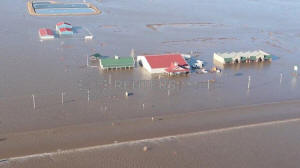|
Climate change's fingerprints are on U.S.
Midwest floods: scientists
 Send a link to a friend
Send a link to a friend
 [March 22, 2019]
By Timothy Gardner [March 22, 2019]
By Timothy Gardner
(Reuters) - Climate change played a hand in
the deadly floods in the U.S. upper Midwest that have damaged crops and
drowned livestock, scientists said on Thursday, while a Trump
administration official said more homework was needed before making that
link.
The "bomb cyclone" that dumped rain on Nebraska, Iowa and Missouri and
killed at least four people now threatens a wider region downstream of
swollen rivers and smashed levees.
Manmade greenhouse gases trap heat in the atmosphere, warming the oceans
and making the air above them more humid, scientists said. When a storm
picks up and eventually spits out that moisture, it can be devastating
for people caught below.
"The atmosphere is pretty close to fully saturated, it's got all the
water it can take," said Michael Wehner, a senior scientist at the
Lawrence Berkeley National Laboratory.
Big storms like the bomb cyclone and Hurricane Harvey, which smacked
Houston in 2017 with record downpours, are where the impact of climate
change can most clearly be seen, he said, adding that climate change's
fingerprints were all over the recent storm.

"I don't think it's a starring role, but it's a strong supporting role,"
said Kevin Trenberth, a senior scientist at the U.S. National Center for
Atmospheric Research, a federally-funded office, of climate change's
role in the Midwest floods.
He said the bomb cyclone was carrying vast amounts of moisture from the
Pacific up to 1,500 miles (2,400 km) away.
Wehner said the flooding was consistent with projections in a government
report issued last November, the National Climate Assessment Volume II,
that said climate change would boost costs in industries from farming to
fisheries and energy production by increasing the frequency of powerful
storms.
That report, mandated by Congress, was compiled by 13 federal
departments and agencies, but was called inaccurate by the White House.
President Donald Trump has cast doubt on mainstream climate change
science and announced his intention to withdraw the United States from
the 2015 Paris agreement, an international accord to fight climate
change, saying it is too costly.
The White House National Security Council has also been considering the
formation of a panel to assess science used in military and intelligence
reports, which have angered Trump by concluding climate change poses a
national security threat.
[to top of second column]
|

Flooded areas are seen near Nebraska City, Nebraska, U.S., March 20,
2019 in this still image taken from a video obtained from social
media on March 21, 2019. Courtesy Nebraska State Patrol/via REUTERS

The White House did not immediately respond to a request for comment
about the link between climate change and the storm.
'FOOL'S ERRAND'
Deke Arndt, chief of climate monitoring at the National Centers for
Environmental Information, an arm of the National Oceanic and
Atmospheric Administration, said that the type of heavy
precipitation that immediately led to the upper Midwest floods is
generally increasing over time.
But trying to link the role of climate change to an individual event
is a "fool's errand" akin to trying to determine the cause of a car
crash while the wheels are still spinning, he told reporters on a
conference call.
More research needs to be done to find a definitive answer on
climate's link to the floods, Arndt said.
NOAA officials said on the call they expect the floods to continue
through May and get more dire as snow melts and water continues to
flow downstream.
Donald Wuebbles, a professor of atmospheric sciences at University
of Illinois, Urbana-Champaign, agreed that climate change likely
made the Midwest floods worse.
But he said that investments in levees and other infrastructure to
deal with changes have not kept up, making communities more
vulnerable.
"People have developed infrastructure for the way the climate was in
the past, and haven't really been able to evolve to the climate of
now and the future," said Wuebbles.
(Reporting by Timothy Gardner in Washington; additional reporting by
Nichola Groom in Los Angeles; editing by Richard Valdmanis and
Rosalba O'Brien)
[© 2019 Thomson Reuters. All rights
reserved.]
Copyright 2019 Reuters. All rights reserved. This material may not be published,
broadcast, rewritten or redistributed.
Thompson Reuters is solely responsible for this content.
 |